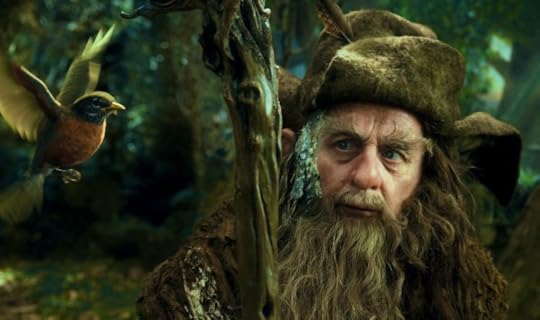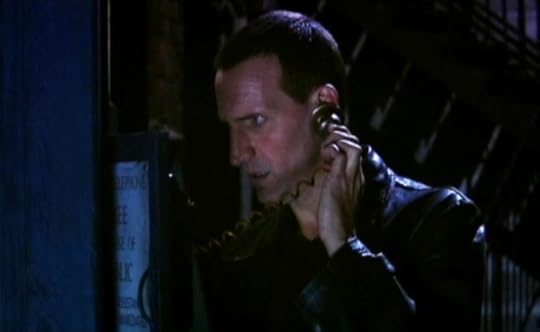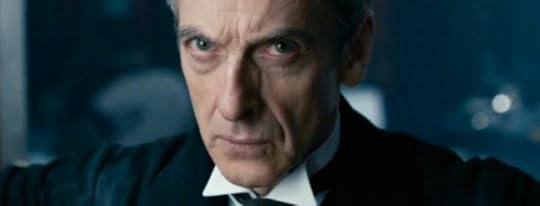Doctor Who Series 9: Musings on Magic
James Lomond is a writer at Kasterborous Doctor Who News and Reviews - All the latest Doctor Who news and reviews with our weekly podKast, features and interviews, and a long-running forum.
Greetings Kasterborites! I have been musing over my Christmas list when it comes to Doctor Who Series 9 and beyond. I’ve been thinking about the darker, edgier direction Series 8 took and the kind of things that give me that little tingle of awe that I think are referred to as “squeee” or “the feels”. And my demands are both vague and specific…
The future of Doctor Who currently lies in the mind of Steven Moffat and his band of writers. Thereafter it rests in the minds of future showrunners – I like to think of them walking among us, bearing The Sign (perhaps a TARDIS-shaped birthmark between the dimples of Venus) unaware that their Who-based daydreams will one day be broadcast to millions…
The other day [British for “recently”] I saw The Hobbit at the cinema… Monsters, magic and good versus evil. This got me thinking, not least because of Peter Jackson’s love for Doctor Who, about where the show could go next. Bear in mind that my brain has mostly been working in a solution of two parts brandy, two parts sherry and one part brain-juice for the past week or more. So any recent “thinking” has been heavily influenced by Christmas *cheer*.
One of the things I enjoy about The Lord of the Rings and The Hobbit are the epic forces and ancient magics that underpin the events in Tolkien’s world. Whatever is happening at any one time is usually part of something much bigger and it’s more than mere politics. (Then, of course, there’s the monsters and adventure). It’s the same thing that makes a lot of fantasy appealing, in my view: things that usually take the form of dramatic irony or providence in ordinary fiction can take on a deeper significance in fantasy literature.

In normal fiction someone might get their comeuppance because of a negative character trait or a convenient twist of fate whereby the good guys always win. Often in fantasy literature narrative tricks and allegories can participate in the narrative in a much more direct way: they can be a part of the events unfolding. The things people do, say and feel – a protagonist’s or antagonist’s agenda – can take affect across time and space (even between universes).
So where stories may sometimes rely on the general principle that the good guys win, coincidence or dramatic irony, in fantasy literature, destiny can take on a very real form. In fact destiny can be identified and interacted with whether as a prophecy, magic or perhaps some feature of advanced technology. There can be more tangible reasons for things turning out the way they do and being able to make narrative structures or tropes actual entities within the story, you can tell richer, more complicated stories. At least that’s my view as a fan of the genre.
Of course this can cause problems as well. We’re all familiar with the aphorism in recent Who that “time can be re-written.” Of course the mechanics of – when it can and cannot be re-written or whether any attempt will be thwarted by the intrinsic structure of wibbly wobbly ball (“destiny” perhaps) – tend to change depending on what is convenient for the writer in that particular story! And fair enough. It’d be difficult to keep a time-travel based show going if there weren’t some arbitrary “fixed points” to shape the narrative here and there.
So in speculative fiction, things that inform the agenda of the key players – things like vengeance, desire, punishment, love and redemption – can take affect across generations and between galaxies whether though spells, programs, transmats or God-like powers. Or they can take effect in ways that are impossible in ordinary fiction. Themes like deceit, the anonymity of war, and redemption can take on other allegorical forms in fantasy fiction. One of the best examples in Doctor Who that I can think of transforms these into a plague…
If you haven’t seen 2005’s The Empty Child/ The Doctor Dances yet, look away now (actually, watch it now!)!
The bulk of the two-parter centres on the harm done by nanogenes (or nanobots) that colonised the body of a young boy killed by a WWII bomb moments before they get to him. He was in the way of danger because he was looking for his mother and died with his gas mask on. His mother had been *too young* when she had him and worse (going by the social standards of 1940s Britain), was not married. Because of this, his mother, Nancy, has had to lie to him from birth and pretend to be his sister…

After his infection with nanogenes, we have an outbreak of gas-masked zombies searching for their mothers. The nanogenes were battlefield medical technology primed to get soldiers up and doing what they were supposed to be doing. Thinking that a lost little boy in a gas mask, looking for his mother is what humans are supposed to be like they set about re-modelling anyone that came into contact with them.
At the denouement the Doctor tells Nancy to go and tell Jamie that she is really his mother. This allows the nanogenes contact with one of the boy’s parents and they recognise maternal DNA as a generation above Jamie i.e. a more authoritative example of what humans are suppose to be like. They also notice the fact that she doesn’t have a gas mask and isn’t on a singular quest to find a longed-for mother – they realise they’d made an error in their wartime swift “repair” based on one example of a human. They reverse all of the sinister damage and even improve some of the victims along the way (a missing leg has returned!).
This is quite a neat and complicated science fiction explanation (and I LOVE it). But the brilliant thing that fantasy genres can do, as discussed above, is feature allegory and other narrative devices as physical realities in the story. We have the literal event of microscopic robots recognising a very concrete fact of human biology paralleled by the emotional event of Nancy being honest about who she is and Jamie discovering that he does have someone who will be a mother to him rather than a big sister. The “cure” from bringing the nanogenes into contact with maternal body and DNA is spread by the Doctor to every other victim.
The truly brilliant part of this is what we also see. If the viewer follows the nanogene plot, they will get that there is a well thought-out speculative scientific event taking place. But we see something that looks like magic from modern traditions of depicting supernatural forces in fairy tales. There is glittering holy light around the embracing mother and child as she reveals who she is, overcomes her shame and gives Jamie the assurance that he is loved. It looks like something from a Disney movie, but the glittering light is really advanced technology doing something very clever. The next thing we see is the Doctor shooting glowing magical powers from his hands – but again with the perfectly thought through sci-fi explanation for what is really happening. What looks like fairy tale magic has a perfect speculative scientific explanation. Moreover this science fiction event is made possible by Nancy’s bravery and the Doctor’s desire to heal. Where bravery and good intentions can take on magical appearances in fairy tale, here their impact has a technological explanation. Never mind the brilliant performances – as a piece of science fantasy writing and directing this is what I call: Bloody brilliant.
So we have an example of Doctor Who doing a sciencey version of shooting powers from your hands in the manner of Harry Potter and LOTR. In those two franchises, and I’d argue in a lot of Manga, the use of magic seems to stand in as an allegory for the strength of emotions and strength of character – moral fibre perhaps. This sort of thing crops up in Doctor Who too, in the love-conquers-all endings we have seen a bit too much of over the years. In The Lodger, Craig’s desire to remain where he is somehow is comprehended by the mysterious ship’s systems and enables him to oppose its pilot-trapping protocols. Then his love for his son in Closing Time somehow overturns the Cybermen’s emotion-removing software. What with the finale to Series 3, Ridiculous Rings of Akhaten and Bracewell’s humanity in Victory of the Dalek’s this can all get a bit much…

But anyway – back to Tolkien and the future of Who. The point I wish to make is that Doctor Who can do magic-plus. It can present all the visual and metaphorical trappings of spell-casting in other fantasy literature and go further, introducing different kinds of explanations and properties. And the reason this is important is because it enable Total Awesomeness. And I’m thinking of the kind of Total Awesomeness that you see when the Wise Old Man (or woman) archetype (the Santas, Merlins and mysterious Sages-on-the-Hill) goes badass. Key examples that give me this particular thrill in LOTR are the showdown between Gandalf and Sauron in The Fellowship of the Ring and similarly the Cure of Theoden in The Two Towers. In The Hobbit, I got “the feels” for the faceoff between Galadriel and Sauron – clips are online (though they probably shouldn’t be so I won’t link!).
In Peter Capaldi we have an actor who, I think, can carry this off more than any other since the Classic era. While Smith managed to portray an ancient Time Lord in the body of a 20-something wonderfully, there’s something that a bit of salt-n-pepper gravitas lends to the role. Capaldi certainly has a contrasting stillness and presence that may come with a bit of seniority.
So this is what I’d like for Christmas, Kasterborites. It doesn’t matter that the big day is gone as the delivery is being made to a production office in Cardiff, and should hopefully already be sitting on a desk:
1) More properly thought out speculative science-magic awesomeness.
2) The Twelfth Doctor getting some Wise-Old-Badass moments – probably involving stuff that looks like cool magic but without a Welsh Children’s Choir or poorly explained leaves.
3) Peter Jackson directing Capaldi in Wise-Old-Badass moments.
That is all. Doctor Who using the flexibility of its format to bring us some truly epic, magical narratives and the Doctor doing some Epic Wizardness – he’s got the Magician’s outfit and the eyebrows. All he needs are the stories. With Series 9, episode 1 being titled The Magician’s Apprentice, might I be getting my wish…?
But enough of my two-parts Brandy rambling! What do you want to see in Series 9 and beyond? What does Doctor Who look like, feel like and do when it’s at its best for you? And what gives you “the feels”?
The post Doctor Who Series 9: Musings on Magic appeared first on Kasterborous Doctor Who News and Reviews.
Christian Cawley's Blog
- Christian Cawley's profile
- 4 followers



